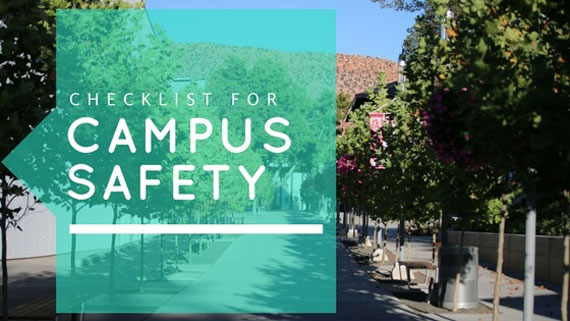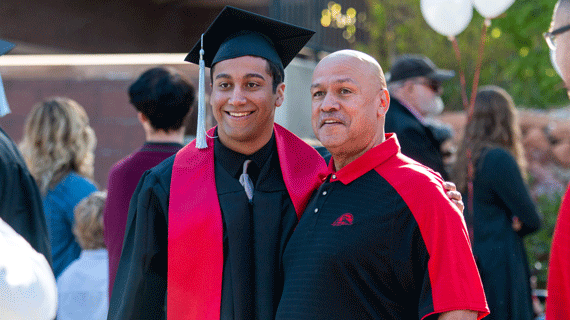T-Bird Parents: 6 Tips for Connecting With Your College Student
Posted: September 18, 2023 | Author: Kierstin Holloway | Read Time: 4 minutes

Having a child start college can be a tricky adjustment, for both parent and student. The dynamic of your parent-child relationship will be undergoing a massive shift. Your child is now a legal adult, living away from you and discovering a world outside the one they were raised in - this time without you there.
Not being able to see or talk to each other as frequently can make it feel like you have become disconnected from your student. Navigating communication is tricky. It's easy to find yourself in the dark without any details as to what's going on in your student's life. Southern Utah University recognizes that parents are an important part of a student's support system and can have a significant impact on academic success.
These six tips for connecting with your college students can help with this transition period:
-
- Be intentional and positive in your language.
Whether texting, calling, or video chatting with your student, make sure to keep your language positive and intentional. Comments such as, 'It's been so long since you called, I was beginning to wonder if you'd been abducted by aliens', will not encourage your student to talk more often. Instead, let them know that you're pleased to hear from them and want to hear about how college life is going.
Refrain from peppering them with critical inquiries, asking genuine questions instead. A question like, 'What has been the best/worst part of the semester so far?' Will give you much more insight, and go a lot farther in helping you feel connected with your college student. Instead of suggesting things they could change to fix a problem try asking, 'How can I help?' Alternatively a simple, 'I'm so proud of you' can empower your student to believe in their abilities and come up with solutions on their own.
- Use a family group chat.
When not overused, a family group chat is an easy way to stay connected with your college student. Including all parents and siblings in the group chat can make it easier for everyone to share news and make plans for holiday visits etc. Make sure to prevent overuse and unnecessary notifications by having one-on-one conversations in direct messages,not the group chat.
- Send a package with a handwritten letter or a card.
How frequently you do this can depend on how frequently you see them, but getting a small care package can mean so much to a college student. Even something small will let them know that they are cared for and remind them that they have a support system. Including a handwritten letter or card is a great way to add a personal touch that will help your college student feel more connected to home and family.
- Let them call you.
If they go radio silent for a day or two it might simply be because they were overwhelmed and busy with classes, homework, and a brand-new social scene.
Don't be afraid to let them call you, and when they do, simply listen and offer support. Waiting for your student to begin a conversation can lead to better communication and a deeper connection. Leaving the ball in their court takes the pressure off your student and lets them set the terms of communication, deciding when and how they want to talk. This makes it easy and more comfortable for all parties involved.
- Establish scheduled calls.
How frequently you decide to initiate contact or send family news updates is personal and highly dependent on your individual family situation. An easy solution for connecting despite distance, differing schedules, and full days is to decide on a specific time to check in with each other. Schedule a phone call at a time that works for both of you, like on a slow Sunday afternoon or between classes. Having this scheduled check-in time (no more than once a week) can help you feel connected to your college student while assuaging any concerns about their well-being.
- Honor boundaries.
A difficult part of adulthood is learning to set and enforce personal boundaries, but this skill leads to healthier, long-lasting connections. Help your student gain confidence by honoring their boundaries.Sometimes a boundary can be something as simple as putting their phone on 'Do Not Disturb' mode while studying. Your student may inform you that they will only be available to communicate via text during finals week; they might request that you refrain from asking questions about their dating life until they bring it up.
- Be intentional and positive in your language.
It's also good to be aware that SUU maintains strict compliance with theFamily Educational Rights and Privacy Act (FERPA). This ensures that all educational information is completely confidential, so if you're concerned about your student's grades the best course of action is to talk to them directly, rather than trying to contact their professors.
Remember that it's okay to feel a little lost about where to begin when it comes to connecting with your college student. Your child is a legal adult now, with all the added pressures and freedoms that come with student life and emerging adulthood, so they're probably feeling a little lost themselves.
Trust yourself and your student. You have come this far! The love you have for your student will carry through these changes and finding new ways to connect with your college student will only strengthen your relationship.
Tags: CurStu Student Life Parents




